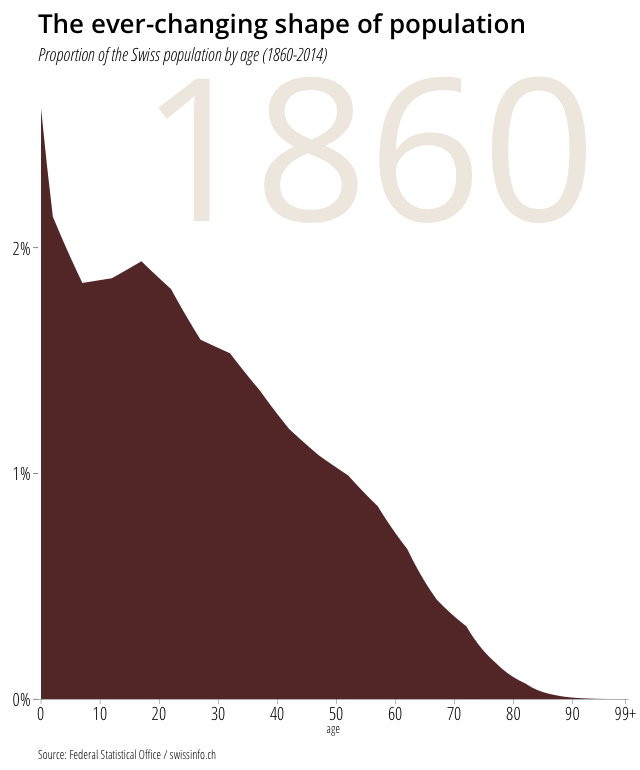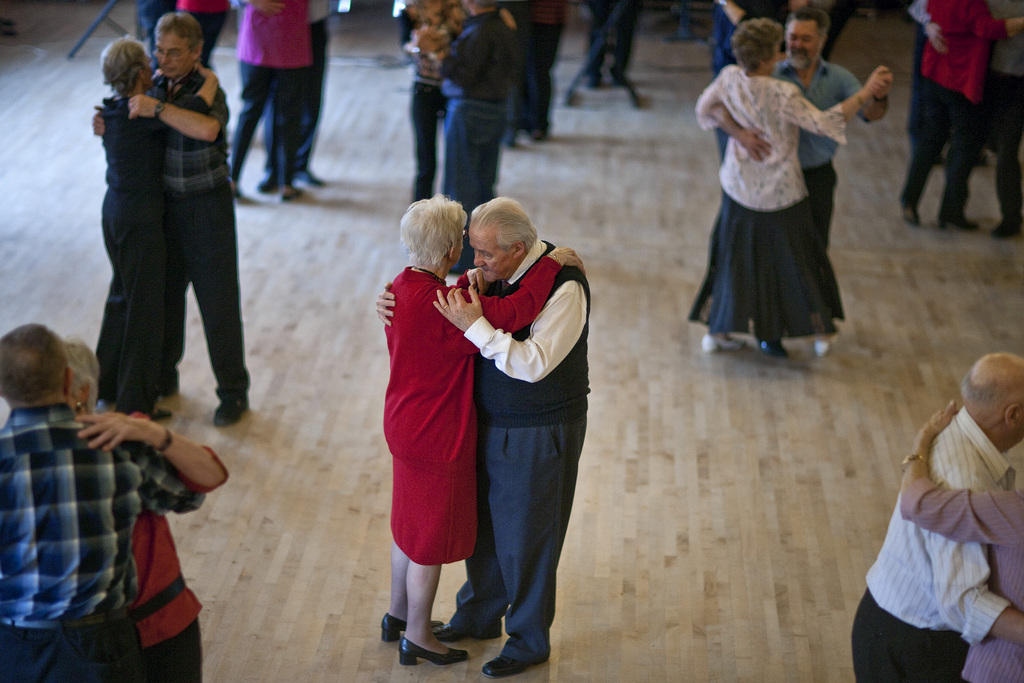The group giving a voice to the elderly

Since 2001, the Swiss Council for the Elderly (CSA, according to its French initials) has given this ever-larger sector of the population a means of speaking out and being heard. But challenges still lie ahead.
“Before, politicians made the decisions affecting the elderly. There were various retirement organisations, but no national group. Now, the Council represents and fights for the interests of this community before the federal parliament and government,” says CSA co-director Michel Pillonel.
The CSA has about 200,000 members, but as spokesperson for the retired community it represents a much larger number: 1,800,000. It works to safeguard their dignity, quality of life, and social and political participation, especially when it comes to decisions affecting them. As their motto puts it, “we don’t want to be spoken about, we want to be spoken with”.

Among the group’s main concerns are the precarious living situation of a third of retired people, the constant increases in health insurance costs, and the limbo-like situation of a growing section of society: unemployed people over 50 years old.
+ In depth: caring for the elderly in an aging society
“Since the birth of the CSA, things have much improved,” says Pillonel. “But this doesn’t mean that we give up the struggle.” The organisation must keep fighting, he says. “We cannot accept people saying that the retired are too expensive, that keeping them healthy is leading us to ruin. This is a current trend, and it is despicable.”
Avoid backsliding
Roland Grunder, the other co-head of the CSA, agrees on the necessity of remaining vigilant to avoid backsliding. He explains this using an analogy:
“Vehicular traffic is increasing at an exponential rate, just like the elderly,” he says. “Transport is regulated, just like the administration of themes related to old age. Many drivers respect the rules, but not all. The placing of radars and traffic police is necessary to avoid bad situations. And for the elderly, the absence of associations could lead to chaos.”

More
Swiss politicians tackle the issue of ageing
Pillonel and Grunder together represent the two tendencies of the CSA. While the former comes from a trade union background, the latter comes from business. Their opposing visions converge in a singular objective: the well-being of the elderly in Switzerland.
The set-up of the CSA has remained the same as when it was founded almost 17 years ago, when then-interior minister, Ruth Dreifuss, brought together the two largest Swiss associations of the elderly with the aim of creating a single interlocutor that would be acceptable to trade unions and both sides of the political divide.
Convergence and compromise
“We cannot speak about the elderly in general just as we cannot speak about the youth in general,” said Dreifuss at the opening session of the CSA in November 2001. “These are not homogenous categories. Therefore, it seems sensible to bring together political forces from diverse horizons in order to try to make progress together.”
Does this uniting of forces succeed without too many setbacks? “Now, more than at the beginning,” says Pillonel. “Back then, both camps were strongly positioned between right and left.” Nevertheless, hardened by a long trade-union career, the co-director of the CSA has managed to keep a path of consensus open through his 12-year tenure.
“Now, the more extreme sides leave their differences aside and most delegates participate in the search for compromise, something which is working very well,” says Pillonel, who in an earlier career negotiated the first collective agreement for the workers of state telecoms giant Swisscom. “In negotiating, you learn to make compromises without selling your soul,” he says.
On the other hand, Grunder came to the CSA a few years ago after a diverse career in positions including communications chief with SwissPost and later with his own company, three decades in the hotel industry, and leading the centre-right Radical party in canton Valais.
“When there is a case of mistreatment in an elderly care home, we don’t think about the political leanings of those involved. The mistreatment is what matters,” he says. “Politics has nothing to do with it. We have to think in terms of ideas, not ideologies.”
The leading idea of the CSA underlines the importance of greater respect for the inter-generational contract in the law. “It’s not about creating privileges for senior citizens; it’s rather about shaping regulations that take due consideration of their needs,” says Grunder.
Autumn of precarity
These needs are considerable, given estimations that the elderly and retired will account for some 22% of the Swiss population by 2030. The precarity faced by a third of retired people is the first concern raised by the CSA heads.
Pillonel mentions the cost of healthcare as one of factors contributing to the increasing impoverishment of senior citizens. “We can’t keep going on like this,” he says. “I think that many elderly people have fallen into poverty because of the cost of health insurance.”
He says that conditions for the retired improved somewhat in 1985 with the introduction of the second pillar system. From then on, they could benefit from their standard state pension coverage plus that of the new pillar. However, for the oldest – those covered only by state pension payments – the situation is not so cosy.
+ How the Swiss three-pillar system of social security and pensions works
Around 500,000 people find themselves in such a situation, and with some 300,000 of them receiving supplementary benefits, the remaining 200,000 live solely from their AVS basic pension income. “I don’t know how they manage,” says Grunder.

More
Ageing trends go global
“To live without much more than CHF2,000 ($2,076) per month is extremely difficult,” he says, before also alluding to the crisis of unemployed over-50-year-olds, whose chances of finding a new position are paltry.
“We talk about working longer in our lives, and from a physical point of view, sure, this is possible. But when companies lay off people at the age of 50 they increase the length of time of unemployment and prolong the problem of aging by effectively beginning it at an earlier stage.”
The golden years?
This 50-year-old segment of the population, however, is not represented by the CSA. Associations do not exist to serve them because – as Grunder underlines – the age of retirement is 65, and it is only at this age that people are considered.
“But the situation has changed and we must look after their needs also,” he says.
This represents a new social challenge about which Pillonel is scathing. “The situation has been stretched to its limit,” he says. Switzerland enjoyed a plentiful period during the so-called ‘30 glorious years’ between the 1960s and 1990s. Switzerland was socially fairer then, before the Thatcherite and Reaganite tendencies came along to poison everything in the economic sector.”

In compliance with the JTI standards
More: SWI swissinfo.ch certified by the Journalism Trust Initiative













You can find an overview of ongoing debates with our journalists here . Please join us!
If you want to start a conversation about a topic raised in this article or want to report factual errors, email us at english@swissinfo.ch.